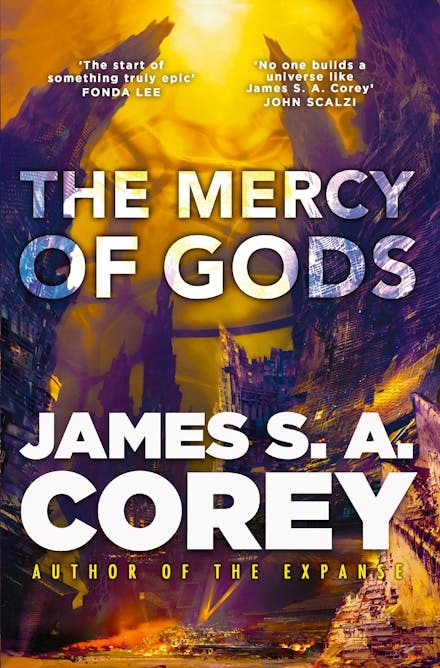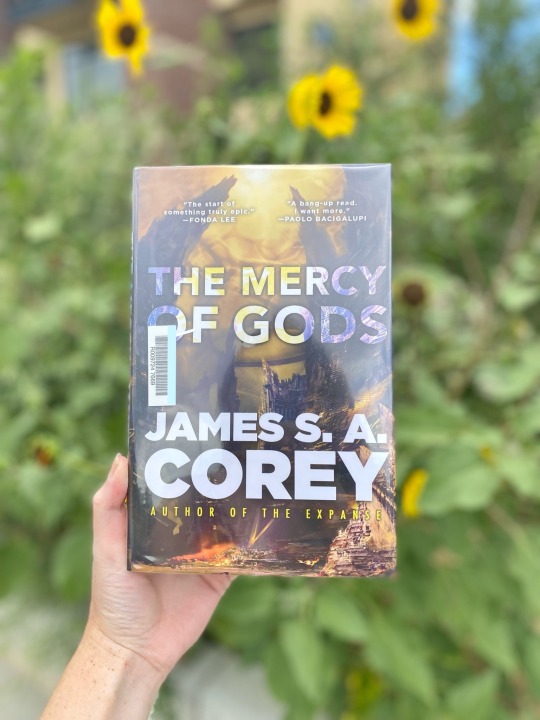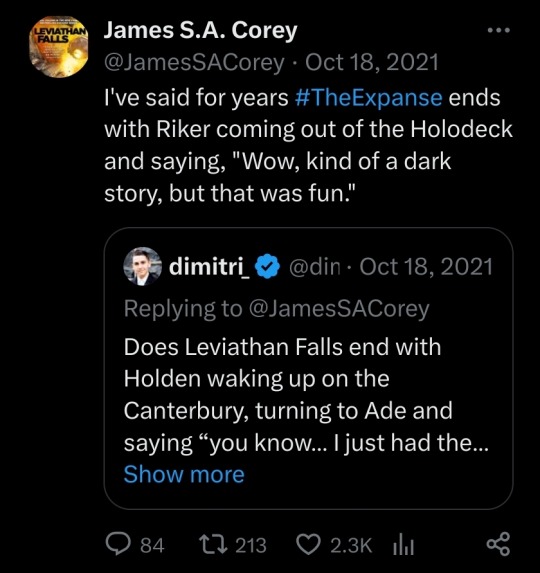#James s.a Corey
Explore tagged Tumblr posts
Text
What I want to know about The Expanse world is how is data storage being managed? If there is that many people across our solar system (and beyond) then where is all the data being stored and how?
This also applies to other sci-fi media. Currently we are so used to places hosting data that it’s become an after thought (until AO3 goes down or someone remembers they don’t actually own a copy of the e-book they bought on kindle).
In The Expanse there are terminals, similar to phones but can do a lot more, where anyone can log in to a terminal with their identifier and then it has all their messages and things they need. So instead of the phone number system we have it’s more like logging in to a universal Facebook. That raises some security issues but not the point here.
By making it a Facebook type system then the person also doesn’t own their own data. It’s not solely stored on their device. There are tech in that world where data is only stored on one thing, like our USB’s, but that’s not the standard because there’s a network. For there to be a network there must be a place to connect it all to.
So, given what happens in book 6 (no spoilers here dw) I reckon it’s stored in the belt, somewhere in vacuum/space, on Luna, or on several of the moons. Reasoning is that reduces a lot of natural heat data servers would have to deal with, reduces natural environment problems. It would absolutely be several locations, sole locations are a serious liability, and also with how much emphasis the series puts on light delay data/communications from one to another that would cause bigger issues.
As I type this I just realised: each station/location would need to have some level of a local copy. There were times that characters quickly set up a new terminal within a minute, and functionally waiting long periods is just bad business.
This likely isn’t something the author considered for the series, because killing or taking data servers hostage would be a way to fuck everyone over. Hence strengthening to the idea that data storage is in *a lot* of locations, making it hard to do a full take over.
There is also some programming elements that make me ‘hmmm’, especially season 1 of the Tv series where a sole person is trying to crack complicated encryption on a time crunch. Don’t get me wrong, I’m a hobby programmer at most, my area is UX, so I don’t know if that’s truely effective. But from how over stated the complexity is it would make more sense to have several people on it (buuut of course story wise it’s cooler if one person can crack the really complicated Martian encryption).
I do wish the TV series showed Naomi as a programmer too, not just electrical and systems engineer. Maybe it’ll pop up later, I can see why they don’t with wanting a more visual way to show what she’s doing, but it feels like it understates her skills and what she can actually do.
Ty for reading my ramble if you made it this far. There’s practically no fandom for this series so mutuals can just second hand enjoy this
#the expanse#leviathan wakes#James s.a Corey#naomi nagata#james holden#amos burton#alex kamal#aw fuck as I was looking Alex’s last name up I got spoilers. damn#satanic speaks#tag: the expanse#tag: books#tag: tv series
17 notes
·
View notes
Text
Some of the spaceship scenes in Abaddon's Gate by James S.A Corey remind me of the Nightflyers novella by G.R.R Martin. There's a similar feeling, also Ren reminded me of the pale young man with watery blue eyes from Nightflyers. I think the he was the first to get murdered on that spaceship. That might be why, in both there's a spaceship and someone is a threat to crew and the ship is heading towards something alien.
2 notes
·
View notes
Text
Rereading Tiamat's Wrath from The Expanse. Naomi is getting everyone ready to bring down Laconia!
I do get distracted reading it thinking how I would turn the stories into an age-of-piracy sea sailing AU. And how that would work in a DnD rpg aspect.
I’m bored and nosy. Please reblog this with the book you’re currently reading.
12K notes
·
View notes
Text
Top TV series on Amazon Prime Video adapted from books
Amazon Prime Video has become one of the most popular streaming services, offering a vast collection of movies and TV shows for its subscribers. With its massive library of content, Amazon Prime Video has emerged as an excellent resource for quality entertainment. One of the main reasons for its success is its production of high-quality adaptations of best-selling books. From thrillers to…

View On WordPress
#amazon#amazon prime#amazon prime 30-day trial#amazon prime video#american gods#book to series adaptation#bosch#good omens#jack ryan#james s.a corey#michael conelly#neil gaiman#philip k dick#the expanse#the man in high castle#tom clancy#watch on amazon prime video
1 note
·
View note
Text
The Expanse: TV Show vs The Book
Last year, I finished ‘Leviathan Falls’, the final book of ‘Expanse’ saga by James S.A Corey. I was introduced to the franchise by the TV adaptation which has completed sixth and possibly the last season. After finishing the book series, I felt there are few differences between the show and the books. Before I proceed, a word of caution. This piece won’t be about which is better. You should…
View On WordPress
1 note
·
View note
Text






Caliban's War (Book 2 of The Expanse, by James S.A. Corey)
Part 3 - It's Bobbie/Chrisjen time!
Parts 1|2|4
#the expanse#the expanse books#caliban's war#james s.a. corey#chrisjen avasarala#bobbie draper#i did not remember that last quote XD#also in the book they have a lot more time to develop their relationship#(though not so much afterwards)#i made this#i just want a tag for the things i personally put out into the world
118 notes
·
View notes
Text





Rocinante crew moments from Nemesis Games that are chef's kiss. (Sometimes the found family IS real.)
#and sometimes I absolutely get why I’ve come across amos and naomi shippers ngl#the expanse#james s.a. corey#nemesis games#amos burton#naomi nagata#alex kamal#james holden#for real though#Holden just came out and asked Naomi why she and amos never hooked up 🤣
80 notes
·
View notes
Text
2024 Book Review #52 – The Mercy of Gods by James S. A. Corey

Introduction
I have never technically read any of Corey’s work before, but I really loved all the seasons of the Expanse I’ve seen. So, as it would be months and months before I could actually get a copy from the library, this is the rare book I actually bought off the strength of the blurb. Even rarer, this actually worked out! This is genuinely quite good, meaty, even fairly original space opera!
On the world of Anjiin, a human civilization has developed from the ruins of some prehistoric colonization mission that ended in atomic fire, their origins a matter of theology and myth. Through blatant nepotism (his aunt is a very important administrator whose made his career her way of honoring her dead sister), Dafyd Alkhor is a research assistant on the most prestigious and celebrated lab/project on the planet – a successful attempt to bridge the gap between the native plant life of the planet and the earth-descended life humanity brought with it. But even as everyone’s enjoying their moment in the limelight, the project is in danger of being split up, the credit and prestige a juicy enough prize for the academic politics to get vicious. And then there’s Dafyd’s rather poorly hidden crush on Else, a much more senior scientist and also the Team Lead’s girlfriend. Everything begins to come to a head, and then-
Well, and then aliens invade. The Carryx and their servitor-species more-or-less effortlessly destroy every human attempt to resist, and then execute one eighth of the population where they stand. Like some massive, chitinous, latter-day Assyrian Empire, they then sort through and abduct a few hundreds or thousands of humanity’s administrative and intellectual elites. Hostages to bring to one of their world-palaces to live at their pleasure and prove their worth as subjects until a place in imperial society can be decided for them – with ‘mass grave’ being an entirely plausibly option if they fail to please. Dafyd, honestly a pretty shit scientist but a natural courtier and schemer, then finds himself desperately trying to understand the Carryx actually want from humanity, and why they refuse to communicate any of it.
Complicity and Collaboration
So this is overwhelmingly a novel about how to react to subjugation – of different emotional and trauma responses to seeing your loved ones killed to make a point, to seeing everything you know destroyed in the space of an afternoon, to being forced into an overcrowded ship and sent to a terrifying new world where your life is valued exactly in proportion to your captors' whims. As the novel reaches its climax, it becomes increasingly about the morality of fawning, servile collaboration and nobly suicidal resistance – of whether it’s better to live kneeling or die standing, essentially.
This is one of very few books I can ever remember reading that make a big dramatic point of that question, and then come down on the side of ‘live kneeling, bide your time until you’ve earned their trust and know enough to stab the knife somewhere vital’. Partially just because every other genre story in the world does stack the deck towards resistance (making victory an almost foregone conclusion if people just have the courage to fight) and this does in the opposite direction (‘resistance’ would be at best a few spectacular terrorist attacks before they’re all hunted down and executed, the first thing the rest of humanity would know of their noble fight is when the retaliatory genocide starts), but still.
I found the start of chapter epigraphs a greater flaw, honestly – they’re quotations from an imprisoned Carryx after some future fall of the empire, who lays the blame squarely on humanity. I’m sure this is building up to some lovely dramatic irony in future books (and is a fun window to Carryx state ideology), but the constant reassurance that the plan works and isn’t just a rationalization for surrender really does drain some of the moral stakes out of the question, you know? From a dilemma with genuinely unclear outcome to just a particularly cruel and slimy trolley problem. Which I mean, still juicy character drama! I did enjoy it.
As Space Opera
There are many works of SFF which are, frankly, setting bibles with an excuse of a story stapled on out of obligation. This isn’t one of them, but it is a book written by people who clearly enjoyed the worldbuilding for its own sake and were always looking for little excuses to show off a bit of it. This is probably clearest with Anjiin – from a plotting perspective, they could have sketched out the basics of the world in a paragraph, assuming they didn’t just use some vague future Earth or Mars instead. But Anjiin actually feels like a fully realized world with its own politics and hypocrisies, its own culture and theology, and (especially) its own beautiful and profoundly alien landscapes and architectures. The last thing makes the book’s job much harder, really – the sense of shock and alienation (as well as a guilty sort of curious wonder) at the Carryx world-palace is vital to the book, making the home the cast is stolen away from so strange and unfamiliar as well can only make it harder to evoke in the reader.
The book spends something like the first fifty pages on Anjiin before the Carryx arrive – before (almost) anyone have the slightest idea they exist – introducing the main cast and their dynamics, sketching out their daily lives, and grounding Anjiin a real, vibrant place that it’s possible to get properly attached to. Vitally, it’s not a world without conflict – Dafyd et al spend the entire time embroiled in high stakes academic intrigues and interpersonal dramas, of a kind that could easily sustain a book on their own. This was a big part of why the book worked so well for me, I think – the loss of Anjiin felt like a loss, the cutting off of possibilities I wanted to see play out, the execution of characters I enjoyed seeing on the page. Given how often these sorts of stories can (unintentionally or no) read ‘and then they were whisked from boring mundanity with dramatic fireworks accompanying them’, I’m glad the book spent the wordcount on it.
The Carryx needed to really overawe and impress, which I think the book mostly manages. Their society seems both plausible and viscerally alien. The book does a neat job of obscuring the exact border between their (weird and fascinating) biology and their obsessively eugenic imperial ideology, in a way that seems very fitting given that both the characters we spend any time with at all are middle/lower-middle ranking strategists and overseers in the imperial project.
This is very much an empire which starts with the iron fist and only bothers mentioning the existence of carrots after a new subject population is brutalized and terrified into full submission. Their ideology is a half-step short of pure power worship, and makes no excuses butchering and exterminating to make the world more convenient for them – none of them ever refer to other species as anything but ‘animals’. This isn’t an empire that tries to convert and persuade – but then, it’s not one that needs to.
The world-palace and assembled ranks of other species gathered in it does an excellent job of being genuinely awe-inspiring even for the characters who hate every solitary thing about it. One great advantage of written science fiction over more visual media is that there’s no real need to make your aliens humanoid or relatable-looking, and Corey takes full advantage of it to fill the prison camp with dozens of memorable, different species – absolute none of which could be played by an actor in makeup.
Of course, those aliens are mostly just set dressing – with the exception of one species of primates that humanity is placed into competition with that ends up in a mutually escalating and quite bloody vendetta – the only alien species represented by actual characters with names and points of view are the Carryx and the infiltration-swarm sent by their great enemy to get scooped up along with humanity and gather information about their inner workings. It does this by consuming and possessing one of the main cast, and the book has great fun keeping coy about who for half the book while still using it as a secondary Point of View. Even more than the Carryx, it does a good job of coming across as both genuinely alien (probably because it is an alien-ness in conversation with the humanity of the two hosts it has assimilated) while still being an incredibly compelling character.
Characterization
Dafyd has a habit/nervous tic of looking for people’s ‘pathological behavior’ – the habits and tendencies they default onto in situations of high stress or while they feel in danger or powerless. This is, then, the lens the book invites as far as its characters go. Every one one of them spends the vast majority of the book cycling from one trauma response to another, and each is probably mostly characterized by the way they respond and the things they fixate on as their world is destroyed and they reckon with their own powerlessness. Fixate on the research the Carryx want and at to try and pretend life is still recognizable, or get angrier and angrier and jump at the first chance to justify beating some other inmates to death to feel a bit of agency and control. Plot out a nobly suicidal strike back against your oppressors, or try desperately to understand what they want so you can manipulate them and ensure the survival of you and yours. Or just constantly make off-color and mostly unfunny jokes.
None of it is exactly subtle, but it all rings pretty true, and does a good job making (almost) every cast member compelling and memorable. It helps, I suppose, that we end up spending at least a chapter or two in the head of half the main human cast, and get plenty of careful observation or intimate conversation with the rest. I’m aware some people really despise this sort of POV-hopping in a story (especially when it’s mostly just different perspectives on the same broad events/circumstances) but personally I rather adore it when it’s done well and they each seem both plausible and distinct, which this book easily manages.
In Conversation with the Wider Genre
I am at this point a bit of of a connoisseur of the hyper-specific subgenre of ‘space opera/spec fic more generally deeply concerned imperialism, colonialism, the experience of subjugation, and the internal logics of complicity and collaboration’ – a shelf which its always great to add new works to. I don’t particularly think Mercy was written in direct response to or is actively commenting on any similar works, but it is fascinating to do a bit of a compare/contrast. Well, it is for me, anyway.
Compared to your Memory Called Empire’s and your Imperial Radch’s the most salient really thing is how uncomplicatedly awful the Carryx are. Not that the empires in those books ostensibly aren’t, but they’re simultaneously also cultured, elegant, rich – in a word, alluring. We spend as much or more time on the intricacies of Radachi tea ceremonies and soap operas as we do on their atrocities, and even that makes the messy brutality of imperialism far more foregrounded relative to the seductive beauty of salon poetry and monumental architecture than it is in Memory. Mercy, in contrast, mostly shows the awe-inspiring beauty of the Carryx world palaces through the windows of a prison-camp. It’s there – we even meet the subject-species who were enslaved instead of exterminated because they can architect such wonders – but only really incidentally. The glory of the Carryx is their vastness and their overwhelming might, all the elegance and beauty they have is the fruit of conquest – and more often than not, different subject-species are introduced with hints or notes of how much more they were, before they were crushed and carved into something the empire could use. (This is almost certainly related to the fact that the only point of view we get whose at all a native or wiling agent of the empire is very minor, and clearly a villain without much in the day of redeeming or morally interesting features).
The better comparison is really Exordia. Or maybe I’m only saying that because it’s the one I read this year, and thus the one whose interesting little complications are at least somewhat clear in my head. Better put, Mercy is exactly the story Clayton from Exordia thought he was in. In both the empire is both alien and undisguised in its malice (two things that are probably related, really), in both the empire doesn’t feel any need to understand or integrate humanity, when overwhelming superiority in technology, scale, and availability of coercive force allow it to just threaten and brutalize until it gets what it wants. The humans in Exordia are just both more and less lucky. Less, because their alien invaders are even more monomaniacally (indeed, metaphysically) malevolent to the point that even being their willing accomplice only buys hours to days of life. More, because they have an ancient relic of a plot device buried in the mountains to give a bit of cause for actual hope in violent resistance (and so a final act of the story concerned with an entirely different suite of messy trolley problems).
It’s an interesting addition to the subgenre anyway – I really can’t recall any other books that have a protagonist collaborating with the empire while not at any point being seduced by it. Well no, that’s a lie – Machinaries of Empire does hit the same beat, just in extraordinarily different ways.
Should Your Read This Book?
The answer is at least partially conditional on how the rest of the series turns out – the narrative absolutely requires sequels, and oh how they could retroactively absolutely ruin it. But with just the one book and a bit of optimism? If the premise seems even slightly intriguing, then absolutely.
66 notes
·
View notes
Text
"Holden was starting to feel like they were all monkeys playing with a microwave. Push a button, a light comes on inside, so it's a light. Push a different button and stick your hand inside, it burns you, so it's a weapon. Learn to open and close the door, it's a place to hide things. Never grasping what it actually did, and maybe not even having the framework necessary to figure it out. No monkey ever reheated a frozen burrito."
--James S. A. Corey, Abaddon's Gate
57 notes
·
View notes
Text


new release goofin’ 🌻 | JOMP book photo challenge | 13 August 2024
#jompbpc#book photo challenge#justonemorepage#booklr#bookblr#bookish#bibliophile#currently reading#the seventh veil of salome#silvia moreno garcia#the mercy of gods#james s.a. corey#book photo
28 notes
·
View notes
Text

"If the thing that calls itself Aliana Tanaka came apart here and never swirled back together, I wouldn't even notice that I was missing."
#WHY IS THERE NO ART OF HER#my problematic fave#the expanse novels#Leviathan Falls#SPOILERS#aliana tanaka#the expanse books#the expanse#james s.a. corey#the expanse fanart#fanart#digital art#portrait#character art#my art#psychological horror#identity horror#scars#cracked mirror
15 notes
·
View notes
Text
Nothing like a character we started to hate and then begun to love as she gets to rip apart at the authoritarian dictator (literally)
6 notes
·
View notes
Text
I think Bobbie Draper and Chrisjen Avasarala are my favorite characters in Caliban's War by James S.A Corey.
Naomi and Amos are cool too. Holden needs to be kept away from anything that can transmit data.
Bobbie and Avasarala point of view chapters are just really fun to read.
15 notes
·
View notes
Text

#when fandoms collide#the expanse#star trek ent#star trek enterprise#james s.a. corey#william riker#the room eats queue
11 notes
·
View notes
Text
James S. A. Corey, who totally doesn't have a size difference fetish:
"I do feel the need to mention, for the ten thousandth time, that Bobbie Draper is Absolutely Enormous. A Gigantic Woman."
79 notes
·
View notes
Text













Caliban's War (Book 2 of The Expanse, by James S.A. Corey)
Part 4 - Just... everything else
Parts 1|2|3
#the expanse#the expanse books#caliban's war#james s.a. corey#i only NOW realized that i used the same holden clip in two gifs ;_;#some of these were VERY hard#people who had multiple conversations in the books were barely in any scenes together#soooo we keep the mistake becaus I'M NOT browsing through all the episodes again XD#anyway READ THE BOOKS#they are very good and fun#i made this#i just want a tag for the things i personally put out into the world
59 notes
·
View notes